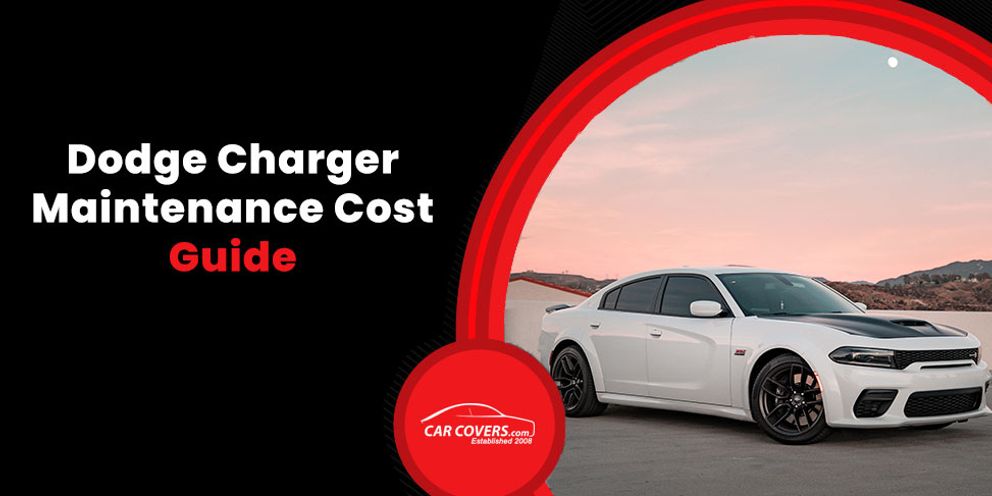
Dodge Charger Maintenance Cost Guide
Dodge Charger Maintenance Cost and Schedule
The Dodge Charger is one of the fastest, most efficient, and top-performing sports sedans in the market. This mid-sized car is built with the best-class torque, incredible horsepower, a supercharged engine, and other top-notch parts and components.
However, owning this vehicle comes with the responsibility of keeping up with scheduled servicing and repairs. It's best to follow a timely inspection, upgrade, and maintenance routine for this car. This way you can spot and solve minor issues early on.
Not only do these procedures keep your overall costs low, but they also ensure your safety on the road. A well-maintained Dodge Charger experiences minimal premature wear and tear, while a scarcely serviced one is prone to malfunctions or even component failure.
In this guide, we'll discuss the average Dodge Charger maintenance cost as well as the common services and repairs required to keep this car in excellent condition.
How Much Is the Average Dodge Charger Maintenance Cost?

The average maintenance cost of a Dodge Charger is $652 per year. This amount is lower than the industry average maintenance costs for vehicles, which is $792 annually. This popular vehicle also has an overall reliability rating of 3.5 out of 5.0, which is an above-average score.
Additionally, the National Highway Traffic Safety Administration (NHTSA) gives the 2022 Dodge Charger (4-door RWD) a 5-star overall safety rating. There are currently three listed recalls for this specific model involving the shifter assembly and TPMS sensors.
Vehicle age, model, and mileage influence a Dodge Charger's total maintenance cost. Driving in relatively hot or cold environments, passing rough roads, and towing heavy loads have an impact on your car's need for servicing as well.
When Should You Service and Maintain Your Dodge Charger?
Dodge charger vehicles with 3.6L and 5.7L engines have an automatic oil change indicator system. You can use this indicator as a guide for when it's time to take your Dodge Charger in for scheduled maintenance.
Factors such as frequency and length of road trips, driving style, and environmental conditions affect when your change oil indicator appears. You'll notice the indicator flashing in the instrument cluster with an accompanying chime sound.
According to the 2022 Dodge Charger owner's manual , oil change intervals shouldn't exceed 10,000 miles, 16,000 km, or 12 months.
The manual provides the following checklist of inspection procedures for every oil change interval as well:
- Oil and filter change
- Battery, exhaust system, and CV/universal joints inspection
- Inspection and replacement (if needed) of engine air cleaner filter
- Inspection of brake pads, parking brake, rotors, drums, hoses, and shoes
- Inspection of the engine cooling system protection
- Tire rotation at first signs of irregular wear
Depending on your area, the average cost of a standard car inspection is around $150 to $250. Meanwhile, an oil change typically costs $137 to $152.
After your service, the professionals at the dealer or auto maintenance shop will reset the oil change indicator for you.
Dodge Charger Maintenance Schedule

The following schedule outlines the various maintenance procedures, major and minor repairs, and estimated costs involved throughout your Dodge Charger's lifespan:
10,000 Miles or 1 Year Mark
After your first 10,000 miles, your Dodge Charger will likely need a few minor services in addition to an oil change. Tire rotation and visual inspections of brakes and belts are the most common procedures during this period.
Additionally, your mechanic might also check for abnormal noises, such as squealing brakes, squeaks when accelerating, or clicking sounds during turns. Fluid leaks involving engine oil, antifreeze, and brake fluids are possible as well.
Estimated maintenance costs for a 10,000-mile service can run from $202 to $232.
30,000 Miles or 3-Year Mark
When your vehicle reaches the 3-year mark, the Dodge Charger manual requires an inspection of the transfer case fluid for all-wheel drives. Replacement of the engine coolant and brake fluid might be necessary too.
You should also replace your engine air cleaner filter as well as your cabin air filter every 12,000 miles. Ask your dealership technician to check and perform recalls on your car, too.
Recalls are issued whenever a manufacturer identifies a component in your car that poses a security risk or fails to meet safety standards. All in all, expect to spend an estimated $406 to $441 for a 30,000-mile service.
50,000 Miles or 5-Year Mark
The 5-year mark is the time when you should change the rear axle fluid on your vehicle. For models with all-wheel drive, changing the front axle fluid is required-especially if you use your car for police, off-road, taxi, or trailer towing purposes.
An annual inspection of the CV/universal joints is a must as well. Make sure to have your car inspected and repaired before the warranty period ends at around this time. The estimated cost of a 50,000-mile service is between $204 and $235.
100,000 Miles or 10-Year Mark
Essential maintenance procedures in your car's 10th year include inspecting and replacing the PCV valve, changing the axle fluids, replacing spark plugs, and flushing and replacing the engine coolant. You'll also need to get your brake linings inspected and replaced if needed.
At this age, you'll notice some evident signs of wear and tear on some components. Avoid skipping minor repairs on drive belts, motor mounts, and suspension bushings. Get your oil leaks fixed, too. Expect to spend around $540 to $624 for your 100,000-mile service.
120,000 Miles or 12-Year Mark
A 120,000-mile service usually involves several part replacements due to your Dodge Charger's considerable age. Have your vehicle's front suspension and boot seals examined and replaced if necessary. If your car has four-wheel disc brakes, adjust the park brakes, too.
On top of that, fluids such as the engine coolant, transfer case fluid, and differential fluid might need changing as well. Your estimated bill for this service ranges from $674 to $733.
140,000 Miles or 14-Year Mark
At this significant mileage, you'll probably need some new brake pads and rotors to go with your routine oil and filter change. Your tires and belts might need total replacement as well.
The degree of critical repairs at this stage would depend on how you've maintained and handled your Dodge Charger over the previous years. A well-managed vehicle will require only minor adjustments compared to a neglected one.
The estimated maintenance cost for a standard 140,000-mile service is $299 to $345.
For more detailed information regarding your specific Dodge Charger model's required maintenance intervals, consult your dealer or review the owner's manual.
Cost of Common Repairs and Replacements for the Dodge Charger
Here are the estimated costs of repairing and replacing several vehicle components for Dodge Chargers. The total amounts include both price parts and labor.
- Car battery replacement: $255
- Brake pad replacement: $154
- Car door lock actuator replacement: $123
- Transmission repair: $900
- Exterior car door handle replacement: $130
- Headlight bulb replacement: $109
- Power window repair: $220
- Spark plug wire replacement: $130
- Drive belt tensioner replacement: $190
Please note that prices may vary depending on your vehicle conditions, exact model, and location.
Dodge Charger Insurance Costs
Car insurance offers financial protection in case your Dodge Charger gets stolen, damaged, or causes impairment on public or private property. It also provides coverage for vehicular accidents and saves you money in the long run.
Automobile insurance policies may differ in terms of monthly premium amounts, policy limits, conditions, and the type of coverage provided. The latest models have substantially higher market values and are more expensive to insure.
The average cost to insure a 2021 Dodge Charger is $2,635 per year or around $220 per month. Meanwhile, insurance for a 2014 Dodge Charger drops down to $2,067 annually.
Here are several insurers that offer policies for Dodge Chargers:
- State Farm
- Allstate
- GEICO
- Country Financial
- Progressive
Types of Dodge Charger Coverages and Policies
Take a look at the following coverages to see what suits your vehicle's safety needs best:
Roadside Coverage
Roadside insurance covers the common costs involved when you experience car malfunctions and need roadside assistance. Tire replacement, battery jump-starts, towing, and fuel delivery are some of the expenses covered by this policy.
This type of coverage is usually offered by auto insurance companies as an add-on policy for $10 to $20 annually.
Liability Coverage
This type of policy comes in two forms: bodily injury liability and property damage liability. The former covers emergency aid costs, funeral costs, and legal defense fees. It also takes care of hospital-related expenses if you're at fault for injuring a person in a car accident.
On the other hand, property damage liability covers damages to buildings and fixtures in case you're at fault for damaging property in a car accident.
According to the National Association of Insurance Commissioners, the average cost of liability insurance premiums per year is $650.
Collision Coverage
Collision insurance covers fees to fix or replace your vehicle after an accident. It offers protection in situations where you've hit a fixed object, another car, or when an external element hits your parked car.
Deductibles for this type of insurance can range from $0 to $1,000.
Medical Payments Coverage
Medical payment policies cover the hospital expenses of people involved in car crashes and other vehicular accidents. In addition to protecting the policyholder, it offers coverage to family members and other passengers as well.
Ambulance fees, surgery costs, and doctor visits are among the expenses covered by this type of insurance. Medical payment coverage limits can range from $500 to $100,000.
Tips on Reducing Maintenance Costs for Your Dodge Charger
A study conducted by the American Automobile Association, Inc. revealed that 35% of drivers have either skipped or delayed a recommended vehicle service. Increasing maintenance costs due to rising labor rates and expensive parts are one of the many reasons why.
Observing good habits and car care practices can help you prevent needless wear and tear and save money on maintenance and repairs. For instance, using a Dodge Charger car cover will prolong your vehicle's lifespan and prevent damage when it's not in use.

Here are some simple but effective car-saving tips to follow:
- Keep your vehicle's interior and exterior free from dust and debris
- Check and repair fluid leakages promptly
- Avoid leaving food in your car that can cause pest infestations
- Use dry and well-ventilated parking spaces
- Wash your vehicle every two weeks or as needed
- Resolve car warning lights as soon as possible
FAQs
Why are regular oil changes necessary?
Your car's engine oil is responsible for lubricating the moving parts that keep your vehicle up and running. However, it gets dirty after a certain period of time and gradually collects dust and debris.
This weakens the oil's efficiency, strains the engine, and affects your car's performance. An oil change keeps your vehicle parts well-lubricated, clean, and running smoothly.
What's the purpose of rotating car tires?
Car tires get worn down unevenly due to the differing characteristics of each wheel position. Accelerating, braking, and turning your vehicle have varied effects on the surface of each tire.
To spread out the wear and keep your tires even, you'll need to rotate them regularly. Doing this also maximizes the tread life of each tire and improves traction as well as braking.
Wrapping Up
In addition to the sticker price, Dodge Charger maintenance costs are another financial factor that's worth considering before you commit to buying this car. Knowing what it takes to keep this vehicle in optimal condition allows you to prepare for future expenses down the road.
Hopefully, you're now familiar with the necessary inspections, fluid switches, and component replacements that your vehicle requires at each oil change interval. Remember, each model of Dodge Charger has unique specifications and may vary in terms of maintenance schedules.
Timely servicing not only ensures the proper functioning of your car, but also promotes efficiency, lengthens lifespan, and prevents accidents. Minor maintenance tasks might seem negligible, yet they go a long way in preserving your car for the many years and miles up ahead.
Updated